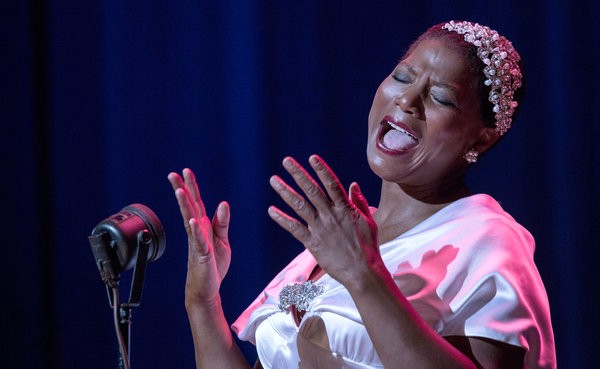It seems as though Queen Latifah was destined to play Bessie Smith. The singer-turned-actress was first approached with the role at just 22 years old, then still in the midst of her rap career. Back then, the project was spearheaded by a major movie studio, with a $30 million budget, a big name director, and a general faith amongst producers that, despite her acting inexperience, Latifah could capture the spirit of the troubled, larger-than-life blues singer who dominated the Jazz Age. But the project fell through, going on to morph into several different versions of itself with varying scripts, stars and studios involved. By the time “Bessie” was finally greenlit two decades later, the movie was being produced for HBO, a newcomer director was at its helm, and Latifah was in her mid forties.
Just as the project needed time to grow and settle into itself, so did Queen Latifah — a feminist hip-hop icon who, over the last two decades, has expanded from just a rapper to a singer, a full-fledged actress, a talk-show host, an executive producer and an entrepreneur with products and endorsements that include a CoverGirl makeup line and her very own perfume. But after a twenty-yearspan of breakthroughs and achievements as an artist and a businesswoman, “Bessie” seems to be the true culmination of Latifah’s success.
Directed by Dee Rees, the two-hour TV biopic chronicles Bessie Smith’s complex and fascinating life from beginning to just before the end: her traumatic childhood and the early loss of her mother, the mentorship from fellow blues songstress Ma Rainey (played brilliantly by Mo’Nique), her meteoric rise to fame and wealth, her decline into her poverty, her inevitable comeback tour and her volatile relationship with husband Jack Gee (Michael K. Williams).
Refreshingly, this film is directed by a black gay woman. Just as refreshingly, there is no ambiguity here about Smith’s sexuality, which in some biographies has been ignored altogether. The film highlights her significance not only as an iconic black singer, but also as a queer pioneer before there was even a name for that, and it does this by presenting her love affairs with both men and women not as narratives of identity crisis but as complex, layered and meaningful relationships. In addition to her troubled marriage to security guard Jack Gee, there’s a tender romance with dancer Lucille (Tika Sumpter), which also takes center stage. The two relationships, in many ways, represent the two sides of Smith — two sides that she never felt obligated to stifle or change for anyone else.
Despite a few flourishes of visual artistry that echo Rees’ feature film debut “Pariah,” there’s a hint of formula in this movie, as it ticks the boxes of so many rise-and-fall music biopics we’ve seen in the past. But there’s also an undercurrent of pure electric unpredictability that ultimately saves the film from those moments when it briefly lapses into cliché.
That undercurrent is Latifah’s performance, which anchors the film not merely because she’s playing the lead, but because she earns it. This is the most honest and the most real we’ve seen Latifah in years, in a role that marries the showmanship of her turn as Matron Mama Morton in Chicago with the ferocity of her performance as the violently volatile Cleo in 1996’s “Set It Off.”
This is a role that demands heightened extremes — Bessie goes from quiet reflection to exuberant joy to blind rage, sometimes in the space of one scene, as she navigates her career and the people in her life. It’s this juxtaposition of vulnerability and volcanism that makes this film work. In one moment, we watch Smith exude light as she sings “Preachin’ the Blues” to a packed crowd, then rage as she singlehandedly squares off with the Ku Klux Klan, then despair when her lover finally leaves her.
Then there’s a moment, Latifah’s Emmy moment, that’s so good it would be almost criminal to record it in any great detail here. In the vaguest sense possible, it’s a brief but powerful scene where not only Bessie Smith the character but Queen Latifah the actress, the performer, the woman, strips away the gloss of a very cultivated persona for one of the most powerful images onscreen in some time.
One can draw many parallels between Smith and Latifah, and perhaps it’s those parallels that make the performance so affecting. Like Smith, Latifah is an artist who helped to define a seminal genre of black music in America. And, like Smith, Latifah is a woman who has consistently refused to be defined by anyone but herself. The most fascinating thing about “Bessie” is watching these two powerful women in a kind of dialogue with each other across time.






